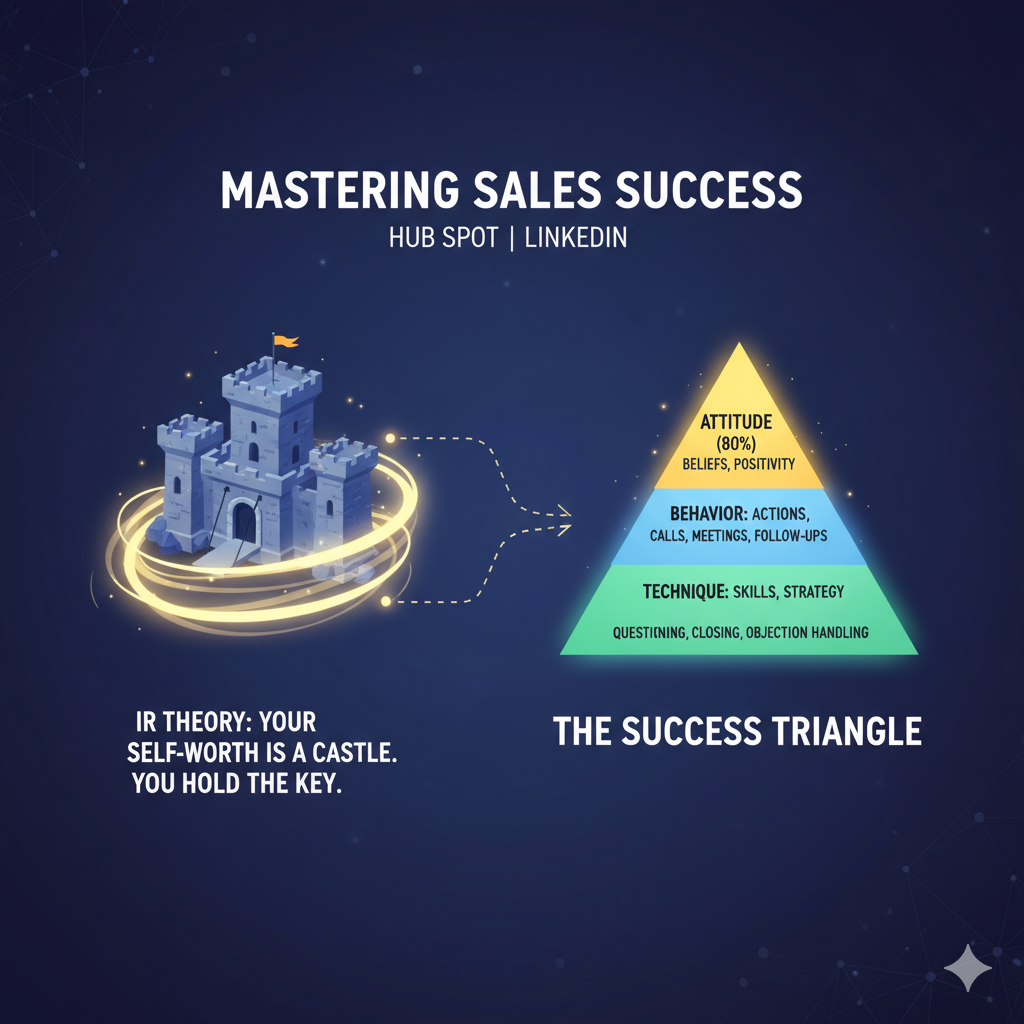Mastering Sales Success: Leveraging IR Theory and the Success Triangle

Understanding IR Theory: Building a Resilient Self-Identity
In the high-stakes world of sales, maintaining a resilient self-identity is crucial. This is where IR (Identity-Role) Theory comes into play. IR Theory helps sales professionals differentiate between their self-worth (identity) and their performance in various roles. Often, salespeople face rejection and challenges that can impact their confidence. By understanding that their value as a human is separate from their role as a salesperson, they can maintain a healthy self-identity.
A practical way to apply this is by visualizing your self-worth as a castle. Only you control the drawbridge, deciding who gets to influence your inner sense of value. This mental separation allows you to take constructive feedback and rejections in stride, focusing on growth and improvement without letting it affect your core self-esteem.
Applying the Success Triangle for Consistent Sales Growth
The Success Triangle is a powerful framework that integrates attitude, behavior, and technique to drive sales success. At the top of the triangle is attitude, which constitutes 80% of your success. This includes your beliefs about yourself, your company, and the marketplace. A positive attitude sets the foundation for effective behaviors and techniques.
Behavior, the second element, involves the specific actions you take to achieve your goals, such as making calls, setting appointments, and following up with prospects. Consistent behavior, driven by a positive attitude, leads to predictable results.
Technique, the final element, encompasses the skills and strategies you use to execute your behaviors effectively. This includes your questioning strategies, closing techniques, and ability to handle objections. Mastering these techniques ensures that your behaviors are as effective as possible.
Practical Strategies to Separate Identity from Role
One of the most significant challenges sales professionals face is taking rejection personally. IR Theory provides a clear strategy to overcome this by separating your identity from your role. Here are a few practical tips:
- Create a Mental Checklist: Before any sales interaction, remind yourself that any outcome is a reflection of your role performance, not your self-worth.
- Use Affirmations: Reinforce your self-identity by using positive affirmations. Statements like "I am valuable regardless of the outcome" can help maintain a strong self-identity.
- Debrief Effectively: After a sales call or meeting, evaluate what went well and what could be improved. Focus on the role-specific actions and avoid self-criticism.
By implementing these strategies, you can handle rejection and setbacks more effectively, maintaining a resilient and positive self-identity.
Creating a Supportive Culture for Continuous Improvement
A supportive company culture is essential for fostering continuous improvement and high performance in sales teams. Leaders play a crucial role in this by promoting a culture where feedback is viewed as a tool for growth, rather than criticism.
- Encourage Open Communication: Create an environment where team members feel safe to share their challenges and successes. This openness fosters trust and collective problem-solving.
- Provide Constructive Feedback: Ensure that feedback is specific, actionable, and focused on behaviors and techniques rather than personal attributes. This helps team members improve without feeling personally attacked.
- Celebrate Wins: Regularly acknowledge and celebrate individual and team achievements. This recognition boosts morale and reinforces positive behaviors.
By fostering a culture that emphasizes growth, learning, and support, you can help your sales team thrive and continuously improve their performance.
In conclusion, mastering sales success involves understanding and applying IR Theory and the Success Triangle. By maintaining a healthy self-identity, consistently executing effective behaviors, and honing your techniques, you can enhance your performance and resilience. Additionally, creating a supportive company culture that encourages continuous improvement will lead to sustained success and growth for your sales team.
